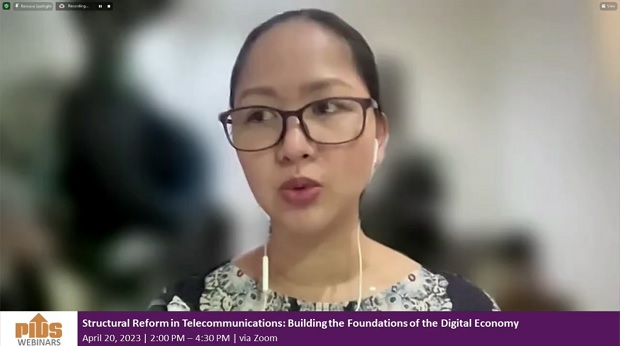“Outdated” regulations in the information and telecommunications technology (ICT) hamper the country’s digital readiness and efforts to drop internet cost, improve speed, and enhance service coverage, experts said in a recent webinar organized by the Philippine Institute for Development Studies (PIDS).
The webinar featured two studies on ICT by senior research fellow Ramonette Serafica and Research Specialist Queen Cel Oren, namely, “Upgrading the ICT Regulatory Framework: Toward Accelerated and Inclusive Digital Connectivity” and “The Philippine Digital Sector and Internet Connectivity: An Overview of the Value Chain and Barriers to Competition”.
The studies conducted a regulatory review of the ICT sector and examined the country’s digital value chain and competition issues, respectively.
Serafica said the Philippine ICT sector still needs structural change even after recent policy updates.
The policy reforms needed to address key challenges include reforming the licensing regime, reinventing the National Telecommunications Commission (NTC) as an independent regulator, and putting pro-competition regulations in place.
“In a dynamic sector such as ICT, there is a need to upgrade the regulatory framework for telecommunications, which underpins the digital economy. There is a need to bring the telecommunications policies to the 21st century,” she urged.
According to one of the studies, the global digital market revenue reached $1.91 billion, while global online services were valued at $17 billion.
In the Philippines, the digital sector’s economic contribution was PHP1.87 trillion in 2021, equivalent to 9.6 percent of the gross domestic product, based on Philippine Statistics Authority data.
National Economic and Development Authority undersecretary Krystal Uy, who served as webinar discussant, agreed that Republic Act 7925 or the Public Telecommunications Policy Act’s congressional franchise requirement for new players is “prohibitive”.
The law, she said, “partially liberalized the telco sector without issuing enabling policies that create a conducive environment for new players to enter”.
“The Philippines remains the only country in the Association of Southeast Asian Nations (ASEAN) region that requires such a franchise. Other countries have moved toward an open access model, allowing competition in all segments of the internet network,” she explained.
She added that the National Telecommunications Commission (NTC), which acts as a regulator, needs to be “modernized and equipped with stronger powers to recall and reassign unused and underused spectrum”, especially since the existing policy is a 92-year-old law (Republic Act 3846).
Fellow discussant and former NTC deputy commissioner Edgardo Cabarios echoed the need for policy reform. “Technology cannot be regulated. Regulations must support technological development,” he said.
Meanwhile, co-author Oren explained the country’s complex, multilayered internet value chain that reflects the breadth and depth of the roles and convergence of international and local companies, making regulation challenging.
According to Oren, the Internet value chain’s “most critical element” is the Internet connectivity segment, where broadband networks reach consumers.
Currently, the Philippines has “the third most expensive ICT service across all the ICT price baskets among the ASEAN member- states”.
Grace Mirandilla-Santos, Better Internet PH’s lead advocate and Secure Connections’ ICT policy analyst, stressed that firms are burdened by “time-consuming and costly” processes and requirements that increase operating costs, pushing prices higher.
“[Outside of Metro Manila], for instance, operators that need to lay fiber cables through several municipalities are required to apply for a certificate even if they do not intend to sell services in these municipalities,” she said.
Under the law, firms that lay cables that traverse towns or deliver “last mile” services, such as internet subscriptions for customers, need to secure the same requirement — a certificate to operate.
“If you have a simplified licensing process, then there is more space for more types of players; even telco-neutral players or internet service providers can grow and expand their infrastructure and help the country build the digital infrastructure,” Mirandilla-Santos said.
Concurring with her fellow speakers, Uy reiterated that “the low-hanging fruit is the licensing regime” and urged “stakeholders to support the regulatory changes that must be done in the [ICT] industry”.
Cabarios added that temporary measures could help push structural reforms forward since enacting a law takes years.
“The Department of Information and Communications (DICT) can issue policy guidelines addressing the current gaps. This way, we can move forward, make the sector more competitive, and reduce the cost of services,” he suggested.
He proposed that the DICT can help bridge the digital divide by providing missionary areas and geographically isolated and disadvantaged areas with broadband access, which can be funded by a portion of the collected spectrum user fees.




